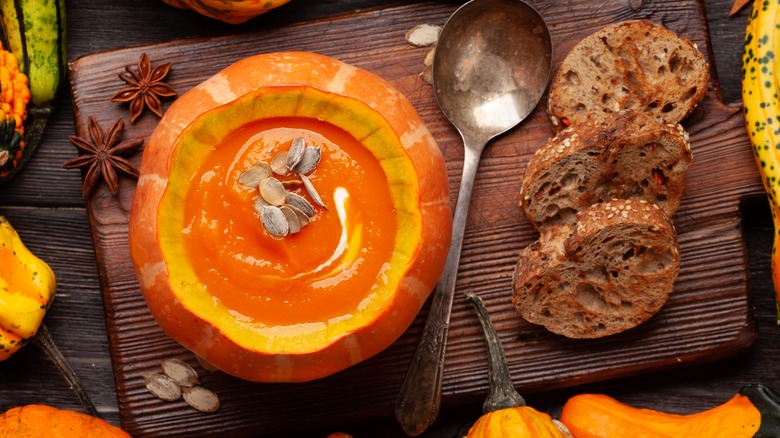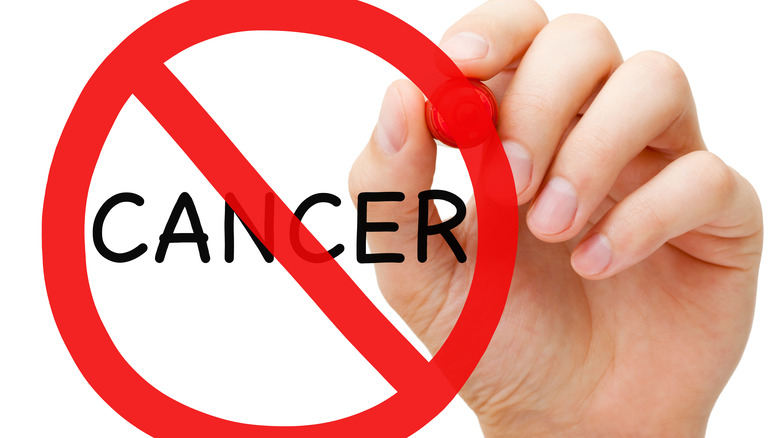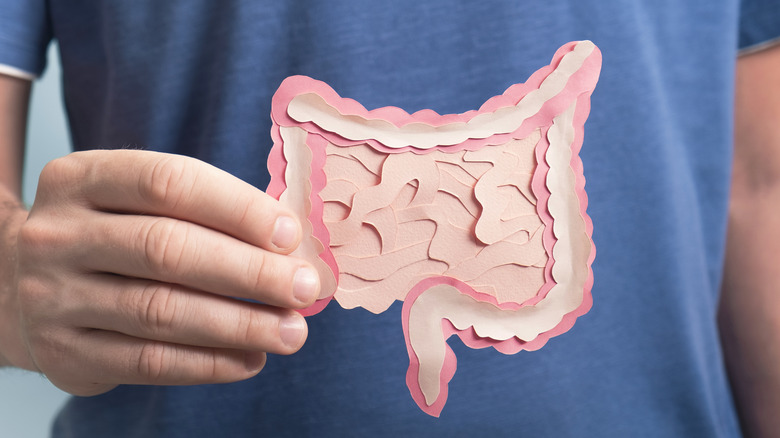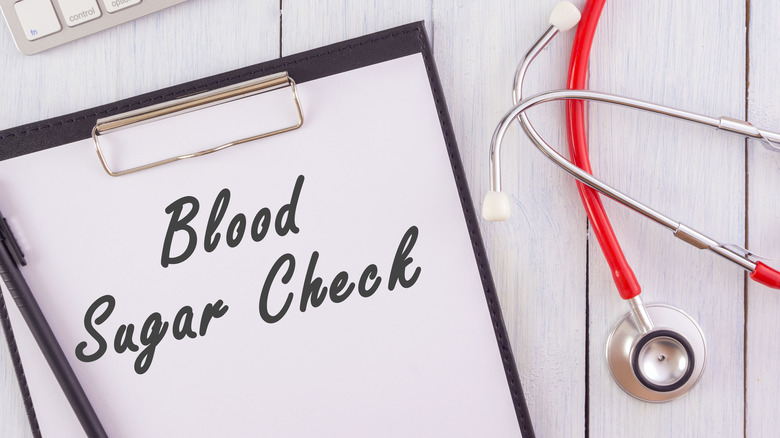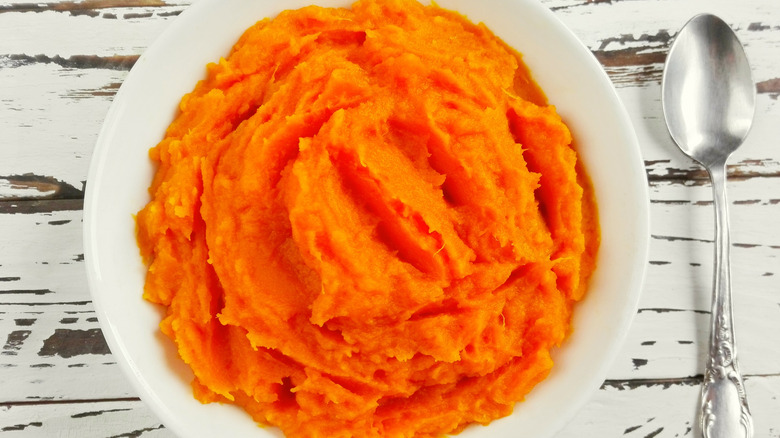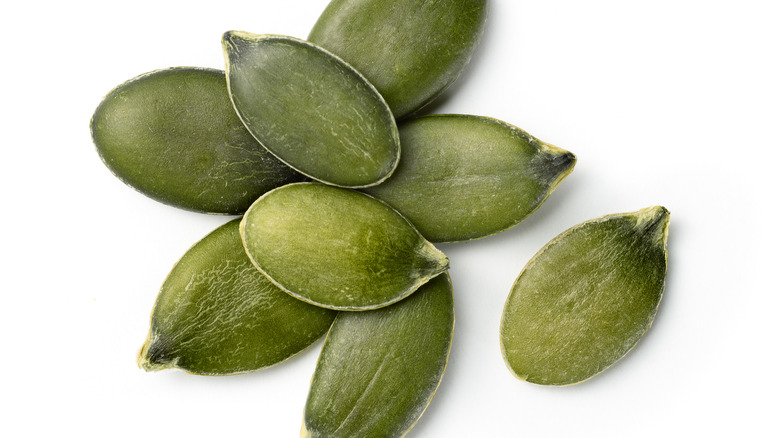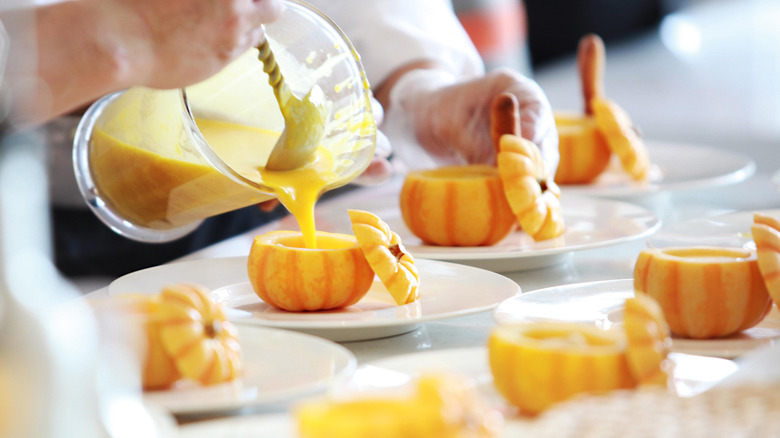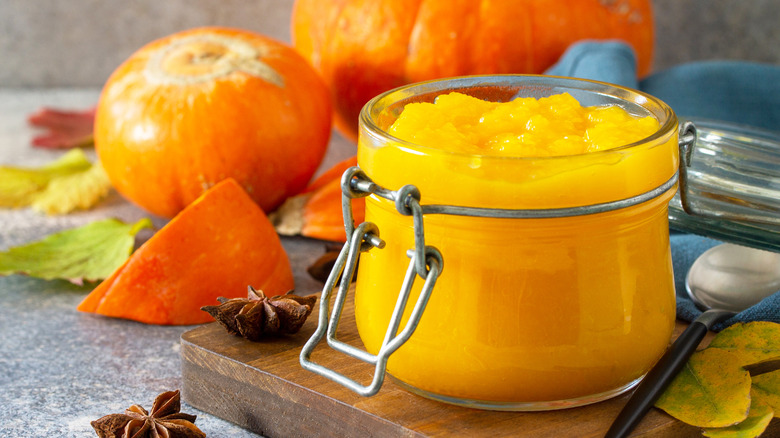When You Eat Pumpkin Every Day, This Is What Happens
Pumpkin always has its big moment in the fall — this vegetable becomes the star of everything from drinks to desserts to snacks and even salads. But even if you associate this orange gourd with fall (as most of us do, because that's when it's in season), pumpkin makes a great option all year long.
Not only is it incredibly versatile, lending itself to sweet and savory recipes alike, but it's also a nutritional powerhouse that will give a boost to many systems within your body. Because its available pre-pureed and canned, it's convenient to keep plenty of pumpkin on hand for all kinds of uses, and once you start incorporating pumpkin into your diet, you'll likely be surprised by all the ways you start responding to this healthy choice.
Here are 10 ways you can expect your health to improve when you start eating pumpkin every day, along with our advice on how to prepare pumpkin and why you should consider snacking on pumpkin seeds, too.
Your eye health improves
If you've ever carved a jack-o'-lantern with big, wide eyes, then you might instinctively be onto something. As it turns out, pumpkins are really great for your eye health.
The American Optometric Association encourages eating pumpkins for healthy eyes because they are rich in nutrients that benefit your peepers, including vitamin A, vitamin C, vitamin E, zinc, fiber, lutein, and zeaxanthin. Good nutrition from whole foods like pumpkins can reduce the risk of chronic diseases that affect eye health, including macular degeneration and cataracts. Free radical damage can cause these conditions to progress, but good nutrition can help fight or even reverse the effects of free radicals within your body.
Studies have shown patients with a high risk of macular degeneration could cut their risk by 25% simply by meeting their needed intake of zinc. Meanwhile, a deficiency of this mineral could cause poor night vision or even cataracts.
You improve your immunity (and increase your life span)
If you're like most people, the chillier weather that rolls in during the autumn season means lots of cozy time indoors — which could ultimately put you, unfortunately, at a higher risk of getting sick. Nobody wants to miss out on their favorite fall activities, which means strengthening your immune system should be high on your priority list, ultimately helping you fight off sickness and feeling your best.
According to Crisp Regional Health Services, a healthy serving of pumpkin could be the secret to getting that much-needed fall immunity boost. That's because pumpkin is rich in antioxidants, including beta-carotene, which your body will process and convert to vitamin A. Additionally, pumpkin has vitamin C and vitamin E, both of which are essential for bolstering your body's immunity. And of course, that also means pumpkins are good for your longevity, as research shows — rather unsurprisingly — that a strong immune system is a key component to living a long life (via the National Library of Medicine).
You reduce your cancer risk
Part of the increased longevity you get from a healthy immune system could be attributed to the way antioxidants keep you protected from sickness like the common cold and the flu. That said, antioxidants are also important for fighting more life-threatening illnesses like cancer, according to the American Institute for Cancer Research. In fact, if you want to decrease your risk for cancer, pumpkin is one of the foods you should be eating in abundance.
See, those same free radicals that diminish your eye health can also cause damage to your DNA and prompt the growth of cancer cells, per the National Cancer Institute. That's why it's important to get plenty of antioxidants that will fight against this free radical damage, and the National Foundation for Cancer Research describes pumpkin as "one of the top cancer-fighting foods" you can eat. When you eat plenty of pumpkin, you are lowering your risk of stomach, throat, pancreatic, skin, and breast cancer.
Your hypertension eases and your heart health improves
You've probably heard before that too much sodium is bad for your heart health, but did you know there's a nutrient out there that can help offset a high sodium intake? That nutrient is potassium — and pumpkin just so happens to be abundant in it.
As the Cleveland Clinic explains, your body has natural ways of excreting too much sodium, but this requires a lot of work from your kidneys. Potassium promotes this excretion, so your kidneys don't retain all the excess sodium the way they would if you were potassium deficient. Without so much sodium in your body, the pressure within your blood vessels comes down, and many other aspects of your heart health improve in turn.
Another article from the Cleveland Clinic states that a one-cup serving of pumpkin provides about 16% of the potassium you need every day, thus helping you stave off vascular problems like stroke or heart disease.
Your digestion improves
How has your digestion been? If you've been having some trouble with your stomach and intestines lately, including such common problems as bloating and constipation, it might be because your diet is lacking in fiber. And the good news is that pumpkin is a rich source of fiber, according to OSF Health Care.
How much fiber is in pumpkin? A one-cup serving of canned pumpkin has about 7 grams of fiber. Specifically, it has what's known as soluble fiber (via SFGate). Soluble fiber dissolves in water and becomes a thick, gel-like substance that moves easily through your digestive tract. Not only does this improve the regularity of your bowel movements, but it also keeps you feeling fuller between meals, helping you to control your blood sugar and even lower your cholesterol.
It's important to note, however, that freshly mashed pumpkin — not canned — often contains more water. So while it is still healthy, it is not nearly as dense in nutrients as the canned stuff. As a matter of fact, fresh pumpkin has only about 2.7 grams of fiber per one cup.
You maintain a healthier weight
Because fiber helps you feel full — and keeps you feeling full for longer between meals — all that fiber in pumpkin can stop you from overeating, which will benefit you in your efforts to maintain a healthy weight (via CNN). That's partly because even though pumpkin makes you feel pretty satisfied, it doesn't have all that many calories. Pumpkin is mostly water (about 90% water, to be specific), so it delivers only about 50 calories for every one-cup serving. That makes it realistic for you to fill up without taking in an excess amount of energy.
However, it's important to consider how you're eating your pumpkin. Even though pumpkin is low in calories, foods made with pumpkin might not be. OSF Health Care explains that pumpkin is a common ingredient in many baked goods and desserts, which can be loaded with fat and added sugar. Even though the pumpkin itself is low in calories, once you add the other ingredients to these recipes, your favorite pumpkin dish can easily become a saboteur to your weight management efforts.
Your sleep improves
Are you somebody who lies awake at night, struggling to find peaceful shuteye? Does this happen to you even during the fall, when sunset is happening a little bit earlier and earlier every day? If that's the case, then pumpkin might be coming into season just in time.
Scripps Affiliated Medical Groups notes that pumpkin could help improve your sleep, thanks to an amino acid known as tryptophan. Yes, it's the same tryptophan you might have heard of — the one that's found in turkey and usually makes you super sleepy after Thanksgiving dinner. Scripps even refers to tryptophan as "nature's sedative."
But it might not be simply the tryptophan's sedative properties that make this amino acid such a key to restful sleep. Tryptophan can also prompt your body to produce serotonin, often referred to as the feel-good hormone. This happy feeling that you get from high serotonin levels means you drift off to sleep in a good mood, thus improving the quality of sleep you get, not just the onset and duration of sleep.
Your skin looks more radiant
Ever wish that your face could just brighten up like a jack-o'-lantern? Well, maybe you don't exactly want that goofy grin on your face, lit up by a flickering candle inside you — but the idea of a brighter complexion does sound very appealing. And fortunately, pumpkin can indeed help you with that.
Taste of Home reports that many of the skin-benefiting nutrients you rely on for a healthy glow can be found in pumpkins, including vitamin A and vitamin C. You might remember learning about how vitamin A protects your eyes. Interestingly, it does the same thing for your skin, undoing the damage caused by excess sun exposure. On the other hand, vitamin C prompts your body to produce collagen, which is essential for skin health.
Pumpkin's benefit to healthy skin goes beyond just eating it, too. For example, your skin can enjoy the benefits of pumpkin when you use it as part of a face mask. The alpha hydroxy acids found in pumpkin are good for exfoliating your skin, which can even reduce the appearance of wrinkles.
Your blood sugar improves
Pumpkin is full of fiber, and all of this fiber is good for helping you feel full and satisfied between meals, thus improving your weight. But did you know that the fiber in pumpkin can also benefit your blood sugar levels — something that's especially important if you have diabetes or are at risk of developing diabetes?
According to dietitian Erin Palinski-Wade, pumpkin has a very low glycemic load of only 3, so it is unlikely to spike your blood sugar the way some other high-carbohydrate foods might. She also explains that pumpkin could help your body increase its production of insulin and improve your body's natural insulin sensitivity, both of which are important to helping your body stave off diabetes.
However, it's important to keep your portions of pumpkin relatively small, because a large serving of pumpkin could end up spiking your blood sugar instead of helping to keep it in check.
You could avoid muscle cramps and improve athletic performance
Imagine this: You've just finished an intense workout, and you've lost a lot of fluid through sweating. You're feeling sore, and your muscles are cramping up a little bit. You reach for an electrolyte beverage for recovery. But what if a little bit of pumpkin could do the work of a post-workout electrolyte beverage?
Well, maybe it can. Avera explains that pumpkin is a great source of the electrolytes potassium and magnesium, which are important for active individuals. Your body uses potassium to balance its fluids, thus enabling your muscles to contract properly. Magnesium is another mineral that benefits not only your muscles, but also your nerves. Without potassium and magnesium, you could suffer cramps, fatigue, and poor muscle recovery after exercise. A single cup of pumpkin delivers 500 milligrams of potassium and 56 milligrams of magnesium, setting you up for optimum recovery from your workout.
Should you choose canned pumpkin or puree your own?
If you're a little bit daunted by the idea of cutting up, steaming, and pureeing your own fresh pumpkin (and who can blame you?), don't worry. In most cases, canned pumpkin works just as well as, if not better than, freshly pureed pumpkin.
Delish notes that there are marginal differences between recipes prepared with freshly pureed pumpkin versus canned pumpkin puree, but in most cases, they are interchangeable. If you do decide to puree your own pumpkin, you should opt for a small sugar pumpkin rather than the large kind you would use for decoration or carving. Also, Delish recommends roasting your pumpkin until it's soft instead of steaming it. This will prevent you from having a watery puree that you might get with a steamed kind.
That said, if you definitely want to know that what you're eating is really, truly pumpkin, it might be best to let yourself make it from scratch. Eat This, Not That explains that most canned pumpkin market on the market — as much as 85% — is actually made from Dickinson squash. They're very similar — so much so, in fact, that it's why the FDA lets manufacturers sell Dickinson squash puree as pumpkin puree.
Don't forget about pumpkin seeds
When you think about eating pumpkin, your mind probably goes straight to the flesh of the actual rind. But there's another part of the pumpkin that lends itself to many culinary uses and is full of nutritive benefits: the pumpkin seeds.
Real Simple explains that pumpkin seeds have many of the benefits typically associated with the rest of the pumpkin, such as antioxidants, vitamins, minerals, and fiber. Like other seeds, pumpkin seeds are a great source of heart-healthy fats, including omega-3s. Additionally, pumpkin seeds contain zinc, which is important for regulating hormones.
If you want to try adding pumpkin seeds to your diet, separate them from the pulp the next time you are carving a pumpkin (or when you're cutting up a pumpkin that you're going to eat). Give them a rinse, and then either enjoy them raw or roast them in the oven to give them a crunchier, more savory taste.
Pumpkin is safe for most people unless you have a pumpkin allergy
Eating pumpkin might be a new venture for some people. Even if they hear all the buzz about pumpkin spice everything when fall rolls around, they still think of pumpkins as a decorative gourd rather than a delicious vegetable for cooking. So is this thing you use to carve a jack-o'-lantern actually safe to eat?
Yes, eating pumpkins is safe, according to Everyday Health. You don't need to worry about pumpkin poisoning. The only major risk is if you're allergic, but pumpkin allergies are not very common (via the London Allergy and Immunology Clinic). Only a doctor can diagnose a true pumpkin allergy, but you might have one if you suffer symptoms after eating or even just carving a pumpkin. You'll feel itchiness around your eyes and your eyelids might even swell up. You could also feel a tightness in your chest. Sneezing is another symptom.
WebMD lists some side effects of pumpkin consumption (even in people who are not allergic), which may include an upset stomach, nausea, and diarrhea.
Need healthy ideas? Give these pumpkin recipes a try
Even if you are somebody who loves pumpkin, you might feel as if the pumpkin hype that happens every fall is somewhat extreme. During this season, it seems like every product needs to have a pumpkin-flavored variant. That said, one of the best ways you can make sure you're enjoying the nutritious benefits of pumpkin without getting bored by it (and without overindulging in too many high-sugar, high-fat, dessert-style pumpkin goodies) is to get creative with pumpkin in your kitchen at home. You might be surprised by how versatile pumpkin really is!
Need some inspiration? First, if you're somebody who likes pumpkin to satisfy your sweet tooth, and if you crave drinkability, you could try whipping up a healthy pumpkin smoothie. You can get the taste of pumpkin pie in a miniature, nutrient-dense version by rolling some pumpkin spice energy balls, which don't even require any baking. And finally, if you want something that's savory, you'll be amazed at how well pumpkin lends itself to chili in this vegan pumpkin chili recipe.

